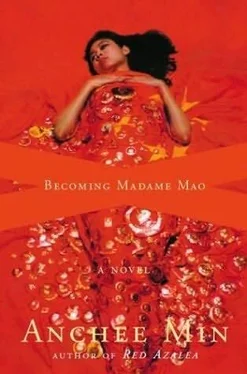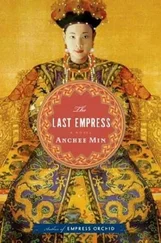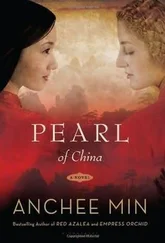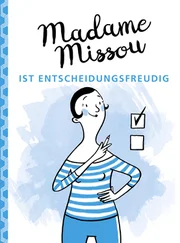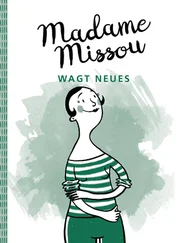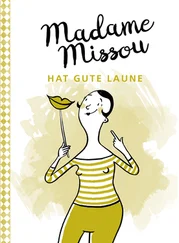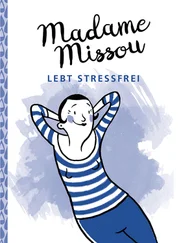Anchee Min - Becoming Madame Mao
Здесь есть возможность читать онлайн «Anchee Min - Becoming Madame Mao» весь текст электронной книги совершенно бесплатно (целиком полную версию без сокращений). В некоторых случаях можно слушать аудио, скачать через торрент в формате fb2 и присутствует краткое содержание. Жанр: Современная проза, на английском языке. Описание произведения, (предисловие) а так же отзывы посетителей доступны на портале библиотеки ЛибКат.
- Название:Becoming Madame Mao
- Автор:
- Жанр:
- Год:неизвестен
- ISBN:нет данных
- Рейтинг книги:4 / 5. Голосов: 1
-
Избранное:Добавить в избранное
- Отзывы:
-
Ваша оценка:
- 80
- 1
- 2
- 3
- 4
- 5
Becoming Madame Mao: краткое содержание, описание и аннотация
Предлагаем к чтению аннотацию, описание, краткое содержание или предисловие (зависит от того, что написал сам автор книги «Becoming Madame Mao»). Если вы не нашли необходимую информацию о книге — напишите в комментариях, мы постараемся отыскать её.
Becoming Madame Mao — читать онлайн бесплатно полную книгу (весь текст) целиком
Ниже представлен текст книги, разбитый по страницам. Система сохранения места последней прочитанной страницы, позволяет с удобством читать онлайн бесплатно книгу «Becoming Madame Mao», без необходимости каждый раз заново искать на чём Вы остановились. Поставьте закладку, и сможете в любой момент перейти на страницу, на которой закончили чтение.
Интервал:
Закладка:
I suppose I have to get over Mao.
Whatever you have to do.
She dreams about Mao. Night after night. The curse-that she wishes him dead-has come to bury her. Yet there is this inborn stubbornness. The way her feeling operates. It is its own cage. It blocks her. She is at a harbor, waving behind a crowd. Turn your head away, she cries to herself. Her heart refuses to let Mao go.
I tell him never to come to me, but I wait for him every day. I send him invitations using all kinds of excuses. When he does come, I show apathy. I either get servants to clean the room or pick up the camera and shoot roses in the garden. I long for him to stay yet I make his visits miserable.
I want him to finish us, I say to Nah. These days I have been spending more time with Nah. She is happy living in the boarding school but she makes sure to spend the weekends with me. She knows the fact that she is with me will give her father a good reason to visit. But I know it won't happen. I never look out the window and never respond to any of Nah's guesses regarding her father's arrival.
One evening my staff views a documentary film as a form of entertainment. The title is Chairman Mao Inspects the Country. I decline to go. When it's on, I hear the sound track from the portable projector over the kitchen. I am struck by a sudden sadness. I can't help but walk over to the screening. When it is finished I clap with the crowd with tears in my eyes.
Long live Chairman Mao and great health to Comrade Jiang Ching! everyone cheers.
In my dream I hear the whistle of a steam engine from a distance. I see wavelike crowds move in blurry dawn light. The ship begins to slowly take off. Thousands of colorful paper ribbons break in passengers' farewell cries. The ribbons dance in the air. It feels like the harbor is being pushed away by the ship. Then the noise quiets down. The crowd watches the ship draw away. It becomes smaller and smaller. The ribbons stop dancing. The sound of waves takes over. The smell of stinking fish is in the air once again.
The vast ocean, glittering under the sunlight.
My heart's harbor vacant.
16
IT'S BEEN TWO YEARS since Mao instigated the movement called the Great Leap Forward. Mao has set himself to be the greatest ruler of all time-he wants to push China to the top of the world's productivity records. The strategy is to release and utilize the energy and potential of the peasants, the same peasants who prosecuted Mao's war to such a glorious conclusion. It will be an explosion of energy and innovation; thus heaven-mandated Communism will be achieved in five years. One will get to do whatever one likes and eat whatever one wants.
Inspired by the notion, the nation answers Mao's call. Every piece of private land is taken away and put under the ownership of the government. Peasants are encouraged to "experience Communism where they live"-free-food commune cafeterias begin to bloom like weeds after a rain. On the industrial front, Mao promotes "backyard steel factories." The locals are ordered to donate their woks, axes and wash basins.
The Great Leap is the perfect expression of Mao's mind and beliefs, his daring and romanticism. He waits for the results anxiously. At the beginning there is praise for his vision, but two years later come reports of violence breaking out between poor and rich. Looting for food and shelter has become a problem. Before autumn the stir becomes so serious that it begins to threaten security. Everything is consumed, including the planting seeds for next spring, while nothing is produced. The nation's last storage is empty. Mao begins to feel the pressure. He begins to realize that running a country is not like winning a guerrilla war.
1959 begins with floods and is followed by drought. A sense of desperation falls across the land. Despite Mao's call to fight the disaster- It is man's will, not heaven, that decides -hundreds and thousands of peasants flee their hometowns in search of food. Along the coastline many of them are forced to sell their children and some poison their entire families to end the despair. By winter, the number of deaths rises to twenty million. Reports have piled up on the desk of Premier Zhou's office.
Mao is more embarrassed than worried. He remembers how determined he was to make his plan a reality. He has issued instructions:
"Race toward Communism"
"Demolish family structure"
"One rice bowl, one pair of chopsticks, one set of blankets- the style of Communism"
"One hectare, ten thousand pounds of yams, two hundred thousand pounds of rice"
"Mate rabbit with cow so the rabbit will get as big as the cow"
"Raise chickens as big as elephants"
"Grow beans as big as the moon and eggplants big as squashes"
In June, peasants' riots rise in Shanxi and Anhui provinces. The Politburo calls a vote to stop Mao's policy.
Mao retreats for the next six months.
My husband has fallen from the clouds. I have only seen him once in three months. He looks low and distressed. Nah tells me that he sees no one. No more actresses. The news fills me with mixed feelings. Of course, I am hopeful that he may reach out to me. But I am also surprised and even saddened-I have never imagined that he could be vulnerable.
Late one evening Kang Sheng visits my place unexpectedly. Mao is in need of you, he tells me excitedly. The Chairman's reputation has been terribly damaged. His enemies are now taking advantage of his error and are setting out to overthrow him.
I take a sip of the chrysanthemum tea. It has never tasted so wonderful as it does now.
I begin to see a way in which I can help Mao. I become so excited with the thought that I neglect Kang Sheng's presence. I see printing machines rolling, voices broadcasting and films projecting. I feel the power of the media. The way it washes and bleaches minds. I can feel the coming success. There is energy going through my body. I am about to enter an act leading to the climax of my life.
Trying to share the pleasure of finding a great role, I explain to Kang Sheng how I feel. But he has fallen asleep on the sofa.
It begins with a convention in July 1959, held on Mount Lu, a resort area where the landscape is majestic. At first Mao appears humble and modest. He admits his mistakes and encourages criticism. His sincerity moves the delegates and representatives from all over the country, among them Fairlynn. Fairlynn criticizes Mao's Great Leap as a chimpanzee experiment; Yang Xian-zhen, a theorist and the director of the School of the Communist Party, points out that Mao has romanticized Communism and has applied fantasy to reality. On July 14, Mao's claimed loyalist, Marshal Peng De-huai, the son of a peasant, a man known for his great contributions and no-nonsense character, sends a personal letter to Mao in which he reports the result of his private investigation-the shocking facts about the failure of the People's Commune-the fruit of the Great Leap Forward.
Mao smokes. Packs a day. His teeth are brown and his fingernails are tobacco yellow. He listens to what others have to say and makes no response. The cigarette travels between his lips and the ashtray. Once in a while he nods, forces a smile, shakes hands with the speaker. Good job. You have spoken for the people. I appreciate your frankness. Be proud of yourself as a Communist.
A week later, Mao claims illness and announces his temporary resignation. Vice Chairman Liu takes over the nation's business.
I do not show my face at any of the meetings although I am at Mount Lu. I read reports sent by Kang Sheng and am more than well informed about the proceedings. Mao is bruised. I have a sense that he will not take it for long. He is not the type who admits mistakes. He thinks of himself as a Communist, but by instinct he is an emperor. He lives to be a leading man, just like me, who can't see herself not being a leading lady.
Читать дальшеИнтервал:
Закладка:
Похожие книги на «Becoming Madame Mao»
Представляем Вашему вниманию похожие книги на «Becoming Madame Mao» списком для выбора. Мы отобрали схожую по названию и смыслу литературу в надежде предоставить читателям больше вариантов отыскать новые, интересные, ещё непрочитанные произведения.
Обсуждение, отзывы о книге «Becoming Madame Mao» и просто собственные мнения читателей. Оставьте ваши комментарии, напишите, что Вы думаете о произведении, его смысле или главных героях. Укажите что конкретно понравилось, а что нет, и почему Вы так считаете.
